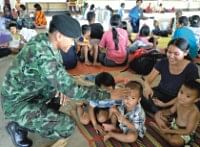| Home - Back Issues - The Team - Contact Us |
 |
| Volume 10 |Issue 17 | April 29, 2011 | |
|
|
International Political will Missing
Bloody recent clashes make a strong case for both Thailand and Cambodia replacing armed troops on border with unarmed officials. The more one listens to it, the more it sounds like a broken record because the words seem to be repeating themselves. But that's the tale of Thai-Cambodian relations defined by the border dispute and the absence of proper guidelines for troops positioned along the overlapping territorial claims. As expected, in the aftermath of border clashes, the two countries immediately accused one another of drawing first blood. This, of course, was followed by a harsh response in the form of diplomatic protest that sounded more and more like pool-hall language. In this latest incident, the two days of fighting resulted in the death of 10 soldiers from both sides. The Thai Army said Cambodia had 'breached' whatever accord the two sides had agreed upon. Thailand said Cambodia was being trigger-happy and suspected that Phnom Penh wanted to internationalise the issue for political gain. Cambodia, on the other hand, said Thailand had stepped up its military preparation towards the direction of a full-scale war, accusing the Thai military of deploying F-16 fighters deep inside their territory. Heavy artillery with "poisonous gas" was also used, the Cambodians said. The Thai Army said only helicopters were employed and they were also called on to evacuate wounded soldiers from the area. The truth is somewhere out there - between the nervous, poorly trained troops along the border to political leaders in both capital cities who lacked the courage to put an end to this conflict. But the two countries can go on all day trading accusations, which won't get to the bottom of the problem. This is not to say that rules of engagement and humanitarian principles are not important. They are - and must be respected. Thai Prime Minister Abhisit Vejjajiva is suggesting that the clashes stemmed from the failure of the two sides to agree on standard operating procedure (SOP) on troop movement and rules of engagement. But while that may be true, the root of the problem is much more than the troops' conduct on the ground. To begin with, the two sides should agree to pull out their troops and replace them with unarmed officials. Too often we see civilians of both sides bare the brunt of the conflict at the receiving end of the clashes. There were also accusations that Thai soldiers were shooting at Khmer historical artefacts and sites. Both sides always said they fired in retaliation. As in simple rules of engagement, perhaps both sides should position their military away from civilians and historical sites. At the least that would get civilians out of the picture. Thailand needs to understand that the longer this conflict drags on, the more the country stands to lose internationally. Thailand is being seen as a big bad wolf for not coming to terms over the ownership of the ancient Hindu Temple, Preah Vihear, while the smaller Cambodia is the victim of a neighbour's internal domestic politics. Bangkok always complains about Cambodia wanting to internationalise the issue. But like it or not, the boundary dispute between the neighbouring countries has already been internationalised, as Phnom Penh was successful in bringing it to the United Nations Security Council and later to an informal meeting of foreign ministers from the Association of Southeast Asian Nations (Asean). Bangkok maintained that a bilateral mechanism is the only way to go. The problem is that none of the available bilateral mechanisms have begun their work, and Thailand appears to be dragging its feet by insisting on them as the only way forward. To make matters worse, the Foreign Ministry and the military are not reading from the same sheet of music, as seen in the disagreement over the facilitating role of Indonesia in its capacity as Asean's chair. Besides the disagreement between the military and the foreign ministries, the Thai Parliament was given a chance to show it has some spine but decided to sit out for fear it would hurt members' re-election chances. If that's the attitude, perhaps they shouldn't enter public service in the first place. This article was first published in The Nation (Thailand). Reprinted with permission.
Copyright
(R) thedailystar.net 2011 |
